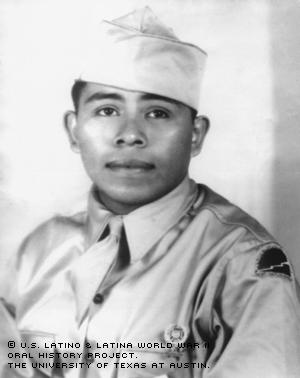
By Kaz Edwards
Benito Morales sits perfectly still on his couch, adjusting only his hands, which lie neatly folded in his lap. Arranged next to him are various pieces of memorabilia from World War II, including a Bronze Star he received for heroic achievement in action.
But Morales doesn’t look at himself as a hero, merely one of the lucky few who made it through WWII alive and unscathed.
A few days after the D-Day invasion in June of 1944, Morales' 9th Infantry Division had been shipped to the shores of Omaha Beach in France. By this time, the Germans had already been pushed inland. He could hear the sounds of battles in the distance, and didn't want to be there.
As German forces continued to strafe and bomb Omaha Beach, more American forces continued to come ashore, including Morales.
He remembers hearing "all the firing and the bombs from across the English Channel" as his division waded their way onto Omaha's shores.
"When I was going overseas [during WWII] I thought I would never come back," Morales said, "I don't consider myself a hero, I consider myself lucky."
From his humble beginnings in the small town of Flatonia, Texas, to his march down Omaha Beach during WWII, Morales has experienced more than most can imagine.
Born June 9, 1923, Morales grew up in the midst of the Great Depression. He remembers a time when, socially, racial persecution was the norm and, economically, many families had trouble making it day to day. For his parents, three brothers and four sisters, life in South Texas was a matter of survival.
At a young age, his father, Cenbio Morales, insisted it was time for him and his older brother to attend school, despite the fact that they were the only Latinos in the class. Morales says the rest of the students constantly picked on them, both physically and mentally. On occasion, the other children would call them "black Mexicans" and try to pick fights with them, Morales recalls.
"When we came out of the school, we had to walk down the road” to get home, Morales said. "And they [the students] use to throw stones at us."
Eventually, he and his brother made friends with some of the "Bohemian" kids who attended the school, and they’d stick together, helping each other out when other kids tried to pick on them.
After the fourth grade, Morales stopped attending school and began working full time on his family's farm, where they grew mainly corn and cotton. Because of the times, they had trouble keeping the farm up and had to take out loans from the bank every year to purchase supplies needed for their crops. This eventually became too much to handle and they had to sell the farm to survive.
After selling the land, Morales and his family moved to Chicago to stay with his aunt. His father was able to get a job at the railroad repairing ties along the tracks, but still needed public aid to take care of his large family. Benito, 16 at the time, took a job in a candy factory, where he worked until he was drafted at age 19.
In 1943 Morales departed for Fort Sheridan in Illinois to begin basic training. After two months, he was given a choice of Armed Forces to join, and he chose the Army. He was sent to North Carolina for six months of infantry training.
In May of 1944, only a month before the D-Day invasion, Private First Class Morales joined the 9th Infantry Division, 39th Infantry Regiment, stationed near Liverpool, England, where they’d wait to replace the ground troops that were already engaged in the fighting. He says the 9th Infantry Division was a mixture of ethnicity, containing Hispanics, Italians and Polish. Despite their different backgrounds, he says they all stuck together, surviving by the motto "one for all, and all for one."
Over the next five months, Morales and the 9th Infantry Division fought across France and into Germany. On May 9, 1945, he was awarded the Bronze Star for heroic achievement in action. In the military certificate noting his battlefield accomplishments, Morales' actions were described in the following manner:
"During the crossing of the Ludendorff Bridge spanning the Rhine River [on March 8, 1945], an enemy artillery shell burst directly in front of the vehicle in which PFC Morales was riding. With complete disregard for personal safety he immediately dismounted from the vehicle and assisted in the evacuation of 11 causalities to the nearest aid station. PFC Morales' aggressive initiative and courageous actions were instrumental in saving the lives of several of the wounded and was a credit to himself and the Armed Forces of the United States."
But Morales doesn’t consider himself a hero, even after receiving the Bronze Star. He simply considers himself lucky.
"I consider myself lucky," he said. "One of my buddies, his whole body got cut in half standing right next to me. Those were the heroes, those that never made it back."
Morales would stay overseas for at least another year before being discharged. After returning to his family in Chicago, he got a job working with his brother at Sunbeam, where he worked for 37 years operating machinery. In 1950, he married Frances Carica and they had seven children: two boys and five girls.
When asked if he’d recommend a career in the military to the younger generation, he paused.
"Only if it's not during a time of war," Morales replied.
Mr. Morales was interviewed in Cicero, Illinois, on December 5, 2002, by William Luna.

